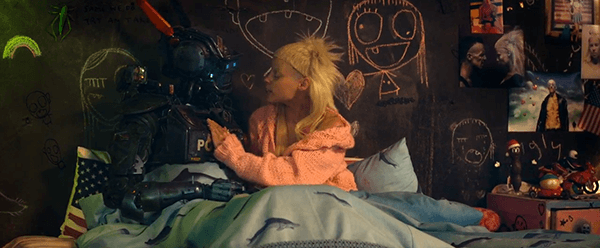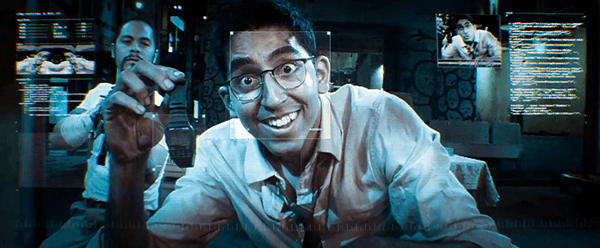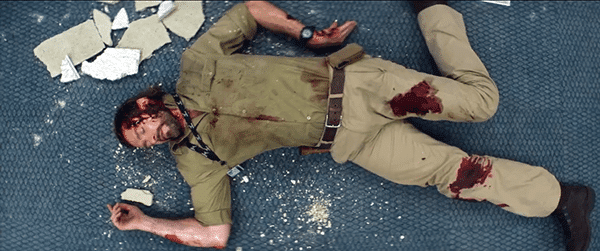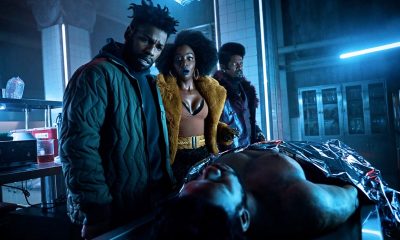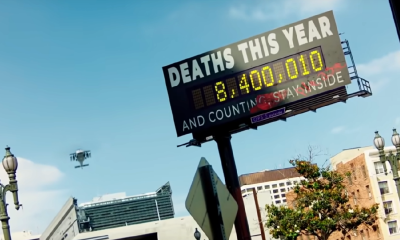Movies and TV
“CHAPPiE” and the New Transhumanist Religion
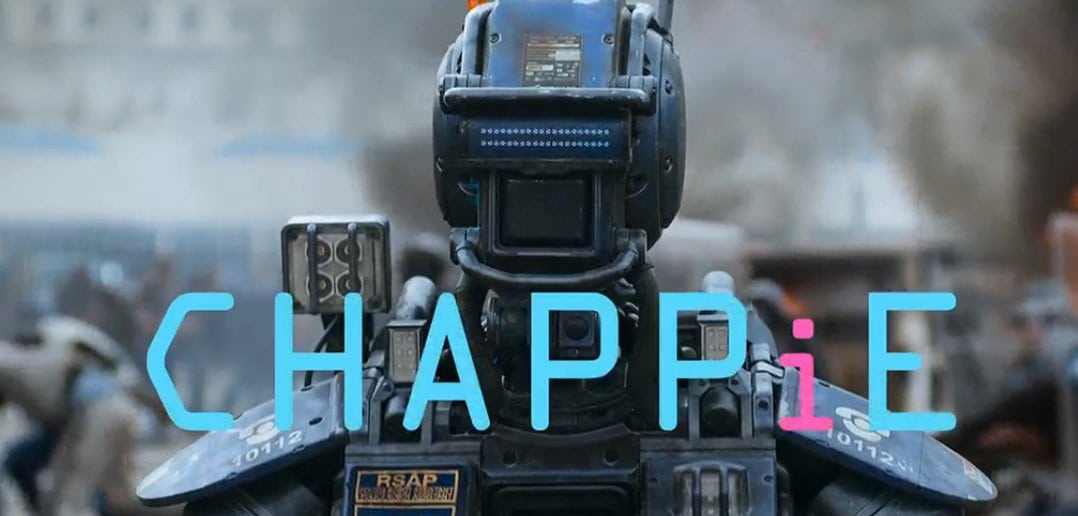
CHAPPiE is a movie about a police robot with advanced artificial intelligence who gets kidnapped by gangsters. However, the true story of the movie is told through allegory and symbols: CHAPPiE is about the abandonment of old religions for a new, futuristic, transhumanist religion.
Warning: Massive spoilers ahead!
CHAPPiE was created by Neill Blomkamp’s, the South African director who is also behind District 9 and Elysium. As in his two previous films, Blomkamp hides a deeper message beneath the guns, the robots and the gangsters, one that even goes in the spiritual realm.
At first glance, the movie appears to be an odd mix of science fiction and Zef aesthetics (South African street culture championed by the rap duo Die Antwoord, who also star in the movie), but there is more than enough symbolism, mainly Biblical, to read a second level of interpretation. Indeed, the story of a sentient robot that becomes aware of its own “mortality” (its battery is dying out) evokes religious and existential questions in the real world where intelligent robots are just about to mix with humanity. However, the movie does not raise its questions or invite reflection. It simply proposes an answer. And that answer can apparently accomplish what religions have been promising since the dawn of time: Immortality. The answer CHAPPiE provides? Transhumanism.
Transhumanism
The concept of transhumanism has been mentioned often on this site because it is an important part of the mass media agenda. In a nutshell, transhumanism is about the merging of humans with robots in order to create “enhanced” humans. Along with the pragmatic, scientific side of transhumanism comes an entire philosophy and belief system, which mainly rejects the concepts that God’s creation is perfect and that humans should not play God.
Max More, the father of transhumanism, eloquently described the spiritual thinking behind the movement in his 1990 essay “In Praise of the Devil”. Here’s an excerpt: (you can download the full original article here).
“The Devil – Lucifer – is a force for good (where I define ‘good’ simply as that which I value, not wanting to imply any universal validity or necessity to the orientation). ‘Lucifer’ means ‘light-bringer’ and this should begin to clue us in to his symbolic importance. The story is that God threw Lucifer out of heaven because Lucifer had started to question God and was spreading dissension among the angels. We must remember that this story is told from the point of view of the Godists (if I may coin a term) and not from that of the Luciferians (I will use this term to distinguish us from the official Satanists with whom I have fundamental differences). The truth may just as easily be that Lucifer resigned from heaven.
God, being the well-documented sadist that he is, no doubt wanted to keep Lucifer around so that he could punish him and try to get him back under his (God’s) power. Probably what really happened was that Lucifer came to hate God’s kingdom, his sadism, his demand for slavish conformity and obedience, his psychotic rage at any display of independent thinking and behaviour. Lucifer realised that he could never fully think for himself and could certainly not act on his independent thinking so long as he was under God’s control. Therefore he left Heaven, that terrible spiritual-State ruled by the cosmic sadist Jehovah, and was accompanied by some of the angels who had had enough courage to question God’s authority and his value-perspective. Lucifer is the embodiment of reason, of intelligence, of critical thought. He stands against the dogma of God and all other dogmas. He stands for the exploration of new ideas and new perspectives in the pursuit of truth.”
– Max More, In Praise of the Devil, Atheist Notes 003
As you can see, More describes Lucifer as a force for good who gives humanity the tools to fight Jehova’s tyranny. This vision is perfectly in line with elite’s Luciferian doctrine as taught in occult secret societies.
CHAPPiE provides a 101 of this mindset in terms that everybody, especially young people, can understand. Mostly, it sells an idea that is being promoted in all kinds of media, especially video game: A robot body is better than a human body.
The Premise
In the not-so-distant future of 2016, the crime-ridden city of Johannesburg has replaced its entire police force with intelligent robots programmed to fight crime. These robots are incredibly effective and boast one massive advantage over their human counterparts: They cannot die and they can be repaired easily.
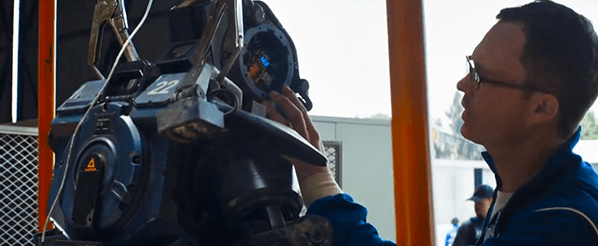
This robot gets its defective part replaced quickly and easily by a worker. You can’t replace the arm of a human cop that easily, that’s for sure. The movie often emphasizes the durability and practicality of robots versus the fragility of organic bodies. Making the masses feel vulnerable in their bodies and selling the superiority of robotic parts is an important element of the transhumanist agenda.
Deon Wilson, the creator of these police robots is widely praised for his invention. He, however, has a more important project in the works: A robot with artificial intelligence so advanced that it can learn by itself, have feelings and even write poems – named CHAPPiE.
CHAPPiE is, however, “kidnapped” by a couple of gangsters who want to train it to commit crimes. Thus ensues a bunch of hilarious adventures that barely make sense. However, beyond the gun-toting action scenes are dialogs and symbols that tell a story with a spiritual dimension. Before this happens, though, the movie makes sure you love that robot by making it as human as possible.
Humanizing the Robot
Although it is not alive and not a human being, CHAPPiE is thoroughly humanized in the movie. Because his artificial intelligence needs to learn everything from scratch, CHAPPiE starts off with the charming innocence and ignorance of a child. Yolandi quickly becomes his “mommy” as she treats him like a child. At one point she says:
“He’s so cute! He’s like a baby.”
She even reads him bedtime stories.
After reading a bedtime story, Yolandi tells CHAPPiE a bunch of things that do not apply to him … because he is a robot. She does not appear to see that.
“It’s not so much how you look that’s special. It’s what’s inside. That’s what makes you different. See, it’s who you really are. Inside. Your soul.
You see…The outside, this is just temporary. When you die, the soul inside goes to the … next place. The thing inside …that’s what mommy loves. Mommy loves you.”
She then proceeds to hug the robot.
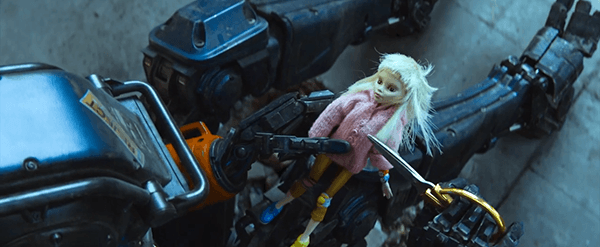
Chappie walks around with a doll representing his mommy, making the audience say “Awww that robot knows what love is! I love him too!”
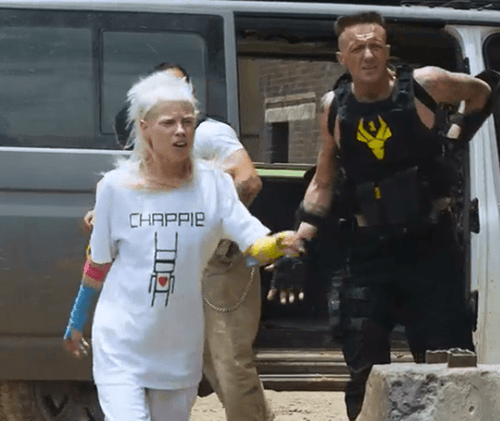
At one point, we see Yolandi walking around with a t-shirt (that she apparently made between gunfights) featuring CHAPPiE with a red heart. They are REALLY trying to humanize that robot.
Now that it is established that we all love the adorable baby robot, we see it go through some tough challenges. That’s a great way to make us love it even more.
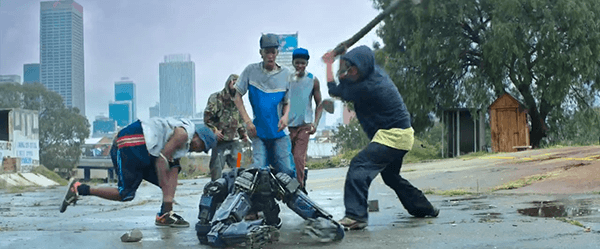
CHAPPiE’s daddy leaves him on the streets to toughen him up. He ends up getting beat up by a bunch of thugs as dramatic music plays in the background. Poooor CHAPPiE! 🙁
The Spiritual Struggle
As CHAPPiE’s intelligence grows, it faces the same existential questions humans have been bogged with since the dawn of time. It is also exposed to two opposite philosophies.
At first, CHAPPiE is mainly exposed to the one who created him, Deon. By constantly referring to himself as “his maker”, the movie strongly suggests that Deon is, to the robot, God – who is also referred to as “the maker”.
Knowing that CHAPPiE is surrounded by shady characters, Deon attempts to teach it moral values and to do the right thing.
“CHAPPiE please have respect for me. I’m your maker. Listen to me, I’m your maker. I brought you into this world, okay? This is serious. You mustn’t engage in these people’s lifestyle choices. No counting narcotics, no robberies, no crimes.
And you’ve got to promise me, your maker, that you’ll never do any of those things, all right? You can’t break a promise.”
CHAPPiE’s mommy and daddy are however less bent on moral rectitude. Quite to the contrary, CHAPPiE’s daddy is eager to teach him that the world is a cruel, savage place where only the strong survive.
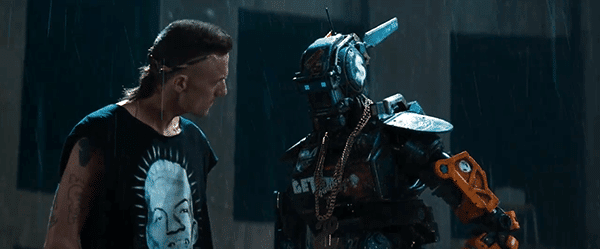
By teaching him the harsh reality of life and by making him aware of his own mortality, Ninja turns CHAPPiE against his maker.
After witnessing a dogfight, Ninja tells CHAPPiE:
-Out there … in the wild … it’s hard. You’re either that dog [points to the dog that is still alive] or that dog [points to the dead dog]. If you wanna survive, CHAPPiE … you must fight. What are you gonna do when that battery runs out?
-I die? CHAPPiE die?
-Deon, he put you in a broken body.
-Deon’s my maker. It doesn’t make any sense. He wouldn’t just make me so I could die. Deon loves me, daddy.
-I can get you a new body, but it takes lots of monies.
In this short dialogue, we get an important chunk of transhumanist philosophy and its spiritual undercurrent. As an intelligent robot that has become aware of his mortality, CHAPPiE realizes that his maker has put him in a situation where death is unavoidable and that the only way to escape it (crimes) is forbidden.
While Deon, the maker, teaches moral values, Ninja appeals to the animalistic, materialistic side. He compares himself to a dog in a dogfight. From a spiritual standpoint, he is Satan opposing God.
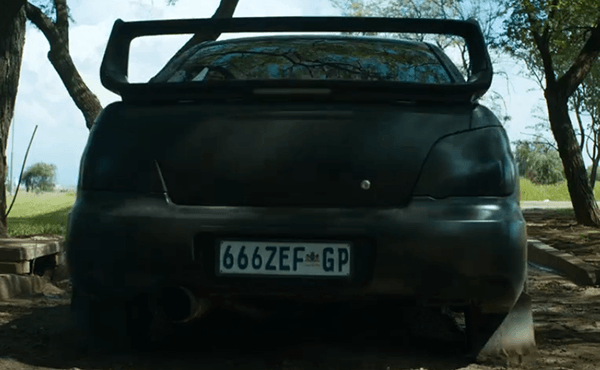
The license plate on Ninja’s car has 666 on it. Other than appealing to the shock value of Zef, the number 666 indicates that Ninja represents Satan, the one who opposes the maker.
After fully engaging in Ninja’s gangster lifestyle, CHAPPiE encounters his maker again. Then ensues a dialog that can also be interpreted as a dialog between mankind and God himself.
-Daddy told me about you, Deon. About how you made me in a body that will die. You are my maker. Why’d you make me so I could die?
-I didn’t make you so you could die, CHAPPiE.
-I want to live, I want to stay here with my mommy. I don’t want to die.
-You’ve become so much more than I’ve could ever have imagined. How was I supposed to know that you would become … you?
In this dialog, Deon says that he could not predict that CHAPPiE would turn into such an intelligent and self-aware robot. This is a reflection of transhumanist philosophy where it is believed that humanity has reached a level of intelligence that surpasses the rest of creation and that God is unfairly limiting its potential by placing it in a physical world where it doomed to die. Believing that they can transcend this mortal state to become gods themselves, transhumans seek man-made technology to achieve nothing less than immortality – the ultimate goal of most religions (who generally refer to spiritual immortality).

The program at the core of CHAPPiE is called genesis.dat. It is yet another subtle reference to the underlying Biblical theme of the movie.
As CHAPPiE seeks to escape his body to escape inevitable death (his battery running out) Deon keeps telling him that it is impossible and that he should simply accept his fate. CHAPPiE is however convinced that he can acquire the knowledge necessary to reach his goal, effectively rejecting the warnings of his maker.
-The problem is greater than your battery. Because you are conscious. You cannot be copied because you’re not data. We don’t know what consciousness is … we cannot move it.
-CHAPPiE can figure it. I can know what it is, then I can move me.
-You can’t move it, I’m sorry.
-You said to me I mustn’t let anybody say that I cannot do something. Daddy says he can get me bodies for the moneys. I hate you … go away.
This dialog represents transhumanist’s rejection of the belief that “playing god” is wrong. Transhumanists have complete faith in science and technology to achieve immortality.
There is, however, one main obstacle to CHAPPiE’s quest: Vincent Moore, a jerk … who is also a Christian.
The Evil Christian Guy
Like Deon, Vincent Moore designs robots at the company Tetravaal. His robot is over awful.
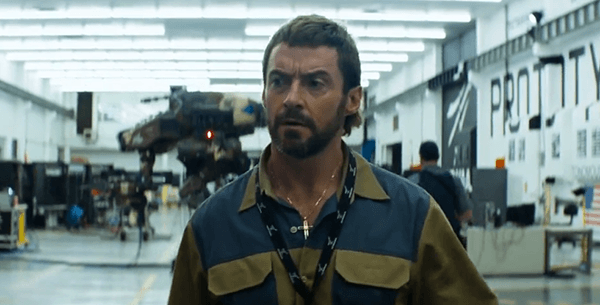
Vincent Moore, CHAPPiE’s nemesis wears a cross pendant, indicating that he’s Christian. Behind him is the robot cop he created, the Moose.
While it is not immediately obvious, the movie leaves enough clues to indicate that Moore is a staunch Christian. For instance, he tells Deon they should go to church together (after threatening him with a gun). Later, when he hears CHAPPiE talking about living forever, we see Moore doing the sign of the cross. He then proceeds to call CHAPPiE a “godless freak”. As CHAPPiE becomes increasingly self-aware, Vincent turns into the “bad guy” of the movie and keeps messing with CHAPPiE and his maker.
While Deon created intelligent, autonomous robot cops that are used by the Johannesburg police force, Vincent’s robot is a big, dumb, ineffective machine that cannot think for itself. In fact, it needs a human to tell it what to do. Is the Moose meant to represent Christians who cannot think for themselves?
One thing is for sure, Vincent hates CHAPPiE and everything it represents. At one point, he kidnaps it and hurts it bad.
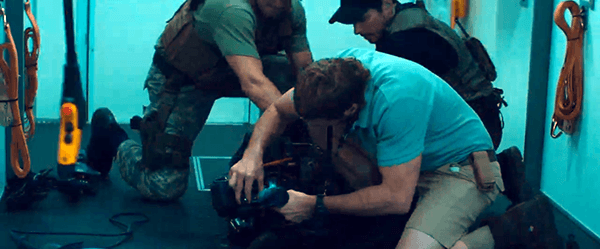
Vincent cuts one of CHAPPiE’s limbs off because he doesn’t like him. Although he’s basically sawing off a robot part made of titanium, the movie turns the scene into a horrific crime, complete with CHAPPiE’s child-like pleads for mercy. This makes viewers say: “Poooor CHAPPiE 🙁 I really hate that Vincent guy!”
Vincent tells CHAPPiE:
“You know that simple AI program makes you think you’re real. You know what? You are not. Just a bunch of wires.”
He’s right. But, since he’s the bad guy, viewers believe that he’s wrong. Also, as the bad guy, Vincent does other awful things: He causes city-wide chaos by shutting down every single robot cop in the Johannesburg. He then uses his Moose robot to kill CHAPPiE’s mommy.
CHAPPiE then gets very mad. He finds Vincent and beats the crap out of him.
In the end, pretty much everybody around CHAPPiE gets badly hurt by the Moose. What’s the answer to save all these fragile humans? Turning them into robots, of course.
Robotizing Humans
After humanizing the robot to make him relatable and “adorable”, the movie then proceeds to robotize humans. Indeed, the people closest to CHAPPiE, his maker and his mommy, are facing death because they’ve been shot.
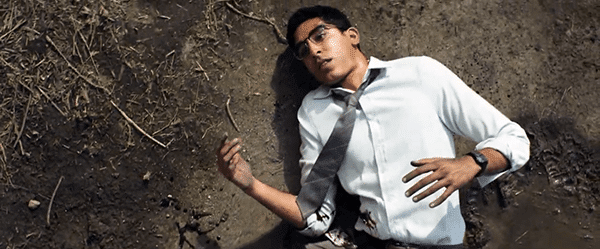
Despite being a god-like maker to CHAPPiE, Deon is still a human. He is therefore fragile and mortal compared to our robot overlords.
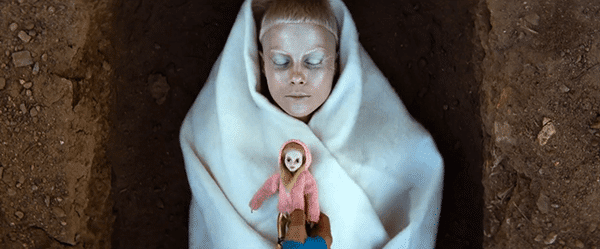
CHAPPiE’s mommy received several gunshots from the Moose and died. She is here being laid to rest … but not for long.
Luckily for them, CHAPPiE discovered how to save a person’s entire consciousness on a single file and he discovered how to upload it to a robot body. In short, he found a way to make humans and intelligent robots immortal. CHAPPiE is, therefore, the savior of humanity … and robots.
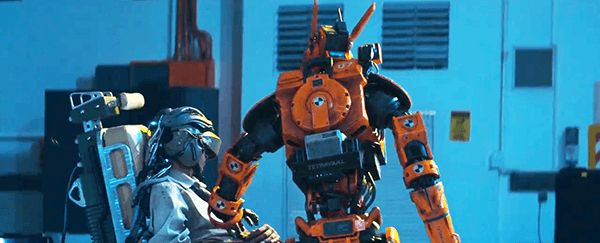
After his consciousness was transferred to a robotic body, Deon touches his dead human body. Goodbye weak human body, hello titanium robot body.
Since CHAPPiE saved his mommy’s consciousness on a USB drive, he can also bring her back from the dead. She was therefore resurrected … like Jesus.

The movie ends with Yolandi, CHAPPiE’s mommy, having a body custom body manufactured into her likeness. She has risen …. as a robot.
In Conclusion
After understanding the philosophical undercurrent of the movie, CHAPPiE becomes less of an entertainment product and more of an infomercial for transhumanism. Beneath the CGI and the actions scenes are arguments pleading for transhumanism as the only way to achieve human salvation.
Since transhumanism is about the merging of humans with robots, the movie blurs the line between what makes a human and what makes a robot. First, CHAPPiE is thoroughly humanized – he is shown growing from child-like innocence into humanity-saving genius. He also loves his mommy very much. The movie even brushes on questions such as: Are intelligent robots “real”? Do they have rights? And so forth.
Then, after thoroughly displaying the fragility of the human body, the movie proceeds to depict the robotization of humans as the way to achieve immortality. As seen above, this robotization was achieved after a period of tribulation between CHAPPiE and his maker which can be interpreted as a period of tribulation between humanity and God. Indeed, through CHAPPiE’s rebellion against his maker to become immortal (and to become a maker himself), the movie describes transhumanism’s rebellion against religions that considers God’s creations as perfect and unalterable. For transhumanists, God left humans in an imperfect body to live in a dangerous physical world. And that needs to be corrected. As Max More stated:
“No more gods, no more faith, no more timid holding back. Let us blast out of our old forms, our ignorance, our weakness, and our mortality. The future belongs to posthumanity.”
– Max More, On becoming posthuman.
Although transhumanist rhetoric goes against religions, it nevertheless requires you to have blind faith in science and technology to salvage humanity and to achieve immortality. And CHAPPiE is one of its many holy books.
- ChatGPT refuses to say one specific name – and it’s making people worried
- COVID 'most likely' leaked from Wuhan lab, social distancing 'not based on science,' select committee finds
- Her Family Made Her Participate In Their Scary Rituals: Mary Knight's Story
- They try to ruin EVERYTHING…
- Karma police! Arrest Ellen DeGenerate!
- It's a big club … and you ain't in it!
- Lady Gaga Performs "Paparazzi" | 2009 VMAs
Get an e-mail notification as soon as a new article is published on The Vigilant Citizen.
-
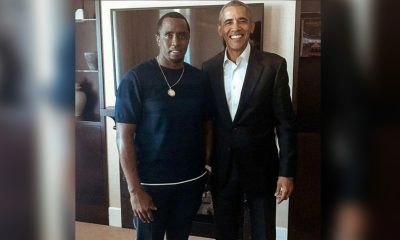
 Latest News2 months ago
Latest News2 months agoThe Controlled Demolition of Diddy
-
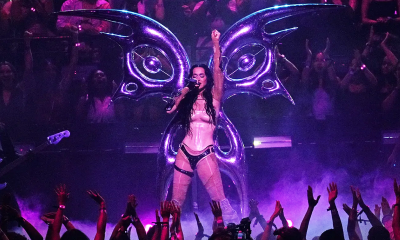
 Music Business3 months ago
Music Business3 months agoThe Hidden Meaning of Katy Perry’s Highly Symbolic Performance at the 2024 VMAs
-

 Pics of the Month1 month ago
Pics of the Month1 month agoSymbolic Pics of the Month 10/24
-
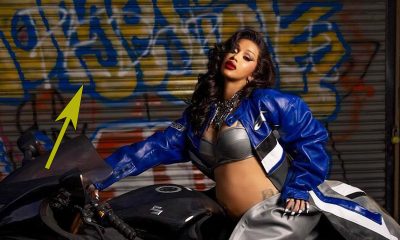
 Pics of the Month3 months ago
Pics of the Month3 months agoSymbolic Pics of the Month 09/24
-
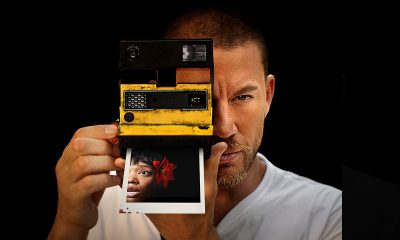
 Movies and TV2 months ago
Movies and TV2 months agoAn In-Depth Look at the Hidden Meaning and Symbolism in “Blink Twice”
-

 Latest News4 weeks ago
Latest News4 weeks agoKamala’s Campaign Was Objectively the Worst in Recent History
-

 Movies and TV2 months ago
Movies and TV2 months agoAn In-Depth Look at the Dark Messages and Symbolism in “Longlegs”
-

 Latest News1 month ago
Latest News1 month agoAn “Urban Opera” in Toulouse Using Massive Machines is Denounced as a Satanic Ritual
